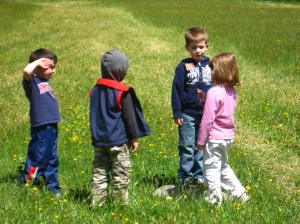Some families wonder why we don’t have manufactured, outdoor play structures. The short answer is that nature is our playground. But let’s look at what nature has to offer children and the ways that they are learning and gaining gross motor mastery. Nature Center Preschool is fortunate to have a variety of natural spaces for children to experience: nature trails, fields and meadows, gardens, and clearings in the woods.
Nature trails offer an opportunity for children to walk on uneven surfaces encouraging them to be more present in the moment as they navigate the trails. Trail walking heightens the senses and promotes greater attention. Children must vary their movements while trail walking—lifting their feet at times over roots, bending to pick up natural treasures, and using positional language while climbing over a log or crouching under an arch of branches. Children’s observational skills are increased through trail walking as we look for ‘squirrel dinner tables’, mushrooms newly unfolding, spider webs in the tree branches, or Indian pipes emerging from the leaf litter.
Unstructured meadow play is wonderful way for young children to develop their creativity, social skills, empathy, as well as communication and problem solving skills. Children can be observed working together to create imaginative and elaborate storylines during meadow play whether they are ponies galloping through the grass, animals camouflaging and hiding, or airplanes getting ready to take off into the air. Young children who are usually reserved in the classroom often shine in the meadow using their imagination as a catalyst for social engagement. Conversations about how the story should be told encourage communication and problem solving skills.
The gardens offer many gross motor opportunities as children pull weeds, push garden carts, dig with shovels, lift watering cans and plant seeds. This play is purposeful work that yields results the children can observe and document for themselves with the long awaited harvest.
There is a small tree in one of our fields that offers children a chance to pull themselves up, balance on the crook of a tree, and take the small risk of jumping off while feeling the wind rush past their ears and through their hair. In this same field, there are small tree cookies for jumping, a sandbox for pouring, measuring and dumping, and a dirt pit that begs for water to be made into the ‘mud kitchen’. The collaboration that takes place while children are creating stews and baked goods out of mud is a sight to behold!
All of this terrific nature play can be summed up with the importance of what Rachel Carson called children’s “sense of wonder”. Without a sense of wonder, there would be no scientists finding cures for diseases or inventors coming up with ideas for the newest technology. A sense of wonder is what drives children to learn; it feeds the insatiable curiosity that is the hallmark of children everywhere. Unstructured play in nature makes this happen. Nature does not suggest what children should do, or think, or imagine. Instead, nature presents open choices, limitless possibilities, and opportunities to explore. That is why we at Nature Center Preschool say, “nature is our playground”.


